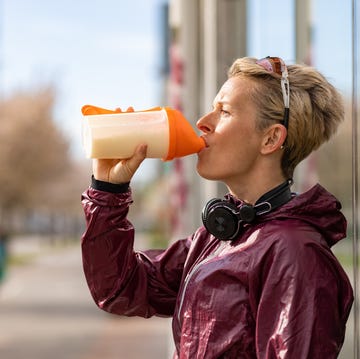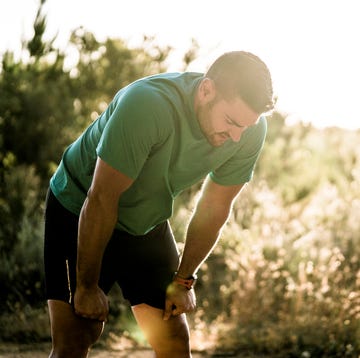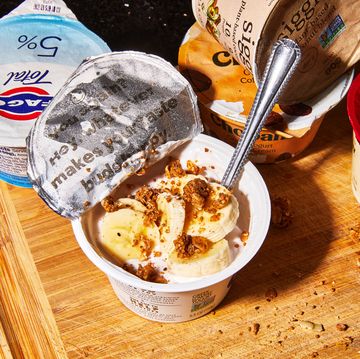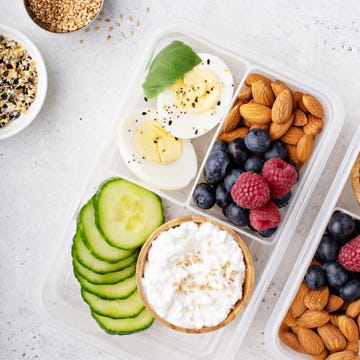If a diet promised to help you lose weight, feel energized, and dodge colds and flu, would you try it? What if you had to give up pasta, bagels, and oatmeal? Carbs may be staples for many runners, but they are one of the restrictions in the Paleo diet, which advocates a model of eating based on prehistoric humans' diets. A growing number of runners have joined its ranks. But is it good for you?
"Paleo has a lot of very good things going for it," says Heather Mangieri, M.S., R.D., spokesperson for the Academy of Nutrition and Dietetics. The program excludes processed foods and refined sugars and emphasizes vegetables, fruits, nuts, and grass-fed meat. All good. "We know diets rich in fruits and vegetables fight heart disease and certain cancers," says Mangieri. Grass-fed meat has a healthier fat ratio than grain-fed, and all meat provides amino acids that speed recovery. A few months after adopting a Paleo diet, ultrarunner Timothy Olson set a new course record at the 2012 Western States 100-Mile Endurance Run. "My legs are less swollen after really long runs," says Olson. "I can go hard again sooner than I did before I went Paleo."
But the Paleo diet also eliminates grains and legumes (both key carb sources for runners), as well as dairy, alcohol, salt, and vegetable oils. Paleo protagonists, such as researcher Loren Cordain, Ph.D., coauthor of High-Protein Snacks for Runners, say that these foods raise your body's acid levels and leach minerals from your bones. Cordain cites substances within those foods (phytates in whole grains and lectins in beans) that inhibit nutrient absorption. But Mangieri disagrees: "Nutrient loss is minimal," she says, "and it doesn't seem to cause deficiencies." She points to Mediterranean populations that enjoy long life and little chronic disease with a diet rich in grains and legumes.
The diet's emphasis on eating high amounts of meat is also concerning, says Matt Fitzgerald, a certified sports nutritionist, running coach, and author of the new book Diet Cults, which explores why certain diets take root in our culture. A 2012 study by the Harvard School of Public Health found that the more red meat people eat, the higher their mortality rate. "I would encourage runners interested in the Paleo diet to eat more fish and poultry and less red meat--and as little processed meat as possible" he says.
***
While there are potential health benefits to going Paleo, experts on both sides of the debate agree the diet in its strictest sense is too low in carbs for runners training hard. Joe Friel, M.S., an endurance coach and coauthor of High-Protein Snacks for Runners, says that Paleo-approved carbs, which include fruits and some root vegetables, can adequately fuel you up before a run. But he notes, "these foods are just too low on the glycemic index to replace glycogen mid- and postrun as quickly as most athletes would like." That means for runners who want to make Paleo work, some "cheating" may be necessary. Olson, who won Western States, needed more midrun carbs to prevent him from bonking on endurance runs. He tried honey, dates, and dried fruit (which are not Paleo-approved), and ultimately found that energy gels worked best for him.
For mid- and postworkout fueling, Friel recommends runners try non-Paleo carbs, such as sports drinks, bagels, rice, and potatoes--but to avoid these foods at other times. That makes Paleo a demanding lifestyle. "It collides with real-world living," says Mangieri, adding that Paleo's restrictions sometimes lead to fast/binge habits. "People end up overconsuming foods they've denied themselves."
Other runners fall off the wagon because they feel inadequately fueled on the program. "For my everyday training of 20 to 25 miles per week, Paleo was great," says runner, climber, and snowboarder Billy Brown, founder of the fitness and gear blog Trek Tech. That changed when Brown started to run ultras. "When I increased my mileage to 45 to 50 miles per week plus resistance training, I needed more fuel in my tank," says Brown, who cured his fatigue by adding pasta and bread back into his diet. But the experiment taught him valuable lessons: "I eat more fruits and vegetables than I ever did before, and my snacking habits are healthier," he says.
Such retraining may be the Paleo diet's greatest value. Will eliminating grains, beans, and dairy make you feel better? Maybe, maybe not. But if dabbling in the diet gives you the handrails you need to cut back on refined sugars, excessive alcohol, and additive-laden junk food, then that is something worth considering.













